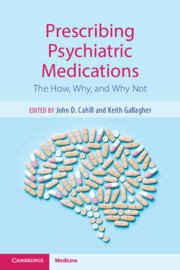Refine search
Actions for selected content:
3410549 results

Friends and Fortunes
- Social Capital Inequality in America
- Coming soon
-
- Expected online publication date:
- May 2026
- Print publication:
- 31 May 2026
-
- Book
- Export citation

Prescribing Psychiatric Medications
- The How, Why, and Why Not
- Coming soon
-
- Expected online publication date:
- May 2026
- Print publication:
- 31 May 2026
-
- Book
- Export citation

The Cambridge Handbook of Islam and Environmental Law
- Coming soon
-
- Expected online publication date:
- May 2026
- Print publication:
- 30 April 2026
-
- Book
- Export citation
The Irish Pope
- Paul Cullen, 1803-1878
- Coming soon
-
- Expected online publication date:
- May 2026
- Print publication:
- 31 May 2026
-
- Book
- Export citation
Population and Society
- An Introduction to Demography
- Coming soon
-
- Expected online publication date:
- May 2026
- Print publication:
- 31 May 2026
-
- Textbook
- Export citation

Filial Lines
- Art Spiegelman, Alison Bechdel, and Comics Form
- Coming soon
-
- Expected online publication date:
- May 2026
- Print publication:
- 30 April 2026
-
- Book
- Export citation

Cognitive Psychology
- Coming soon
-
- Expected online publication date:
- May 2026
- Print publication:
- 31 May 2026
-
- Textbook
- Export citation

Introducing Environmental Communication
- Coming soon
-
- Expected online publication date:
- May 2026
- Print publication:
- 31 May 2026
-
- Textbook
- Export citation

Constructing the Achievement State
- Cultural Administration in Postrevolutionary Egypt
- Coming soon
-
- Expected online publication date:
- May 2026
- Print publication:
- 31 May 2026
-
- Book
- Export citation

Selected Prose of John Dryden
- Coming soon
-
- Expected online publication date:
- May 2026
- Print publication:
- 31 May 2026
-
- Book
- Export citation
Reason and the Good in Leibniz, Kant and Hegel
- Theodicies of Freedom
- Coming soon
-
- Expected online publication date:
- May 2026
- Print publication:
- 31 March 2026
-
- Book
- Export citation
On Trade War
- Coming soon
-
- Expected online publication date:
- May 2026
- Print publication:
- 31 May 2026
-
- Book
- Export citation

Connecting with Australian Tort Law
- Coming soon
-
- Expected online publication date:
- May 2026
- Print publication:
- 31 May 2026
-
- Textbook
- Export citation

The Minority Mind
- Jews and Protestants in Catholic Ireland, 1912–1968
- Coming soon
-
- Expected online publication date:
- May 2026
- Print publication:
- 31 May 2026
-
- Book
- Export citation
The Coup Trap in Latin America
- Coming soon
-
- Expected online publication date:
- April 2026
- Print publication:
- 30 April 2026
-
- Book
- Export citation

Relative Clauses in Proto-Indo-European
- A Study in Syntactic Reconstruction
- Coming soon
-
- Expected online publication date:
- April 2026
- Print publication:
- 30 April 2026
-
- Book
- Export citation

The Fraying Bonds of Peace
- Economic Origins of the First World War
- Coming soon
-
- Expected online publication date:
- April 2026
- Print publication:
- 30 April 2026
-
- Book
- Export citation

Classical Algebraic Geometry
- A Modern View
- Coming soon
-
- Expected online publication date:
- April 2026
- Print publication:
- 30 April 2026
-
- Book
- Export citation

Pragmatism Revisited
- Coming soon
-
- Expected online publication date:
- April 2026
- Print publication:
- 30 April 2026
-
- Book
- Export citation

Elizabeth Bowen in Context
- Coming soon
-
- Expected online publication date:
- April 2026
- Print publication:
- 31 May 2026
-
- Book
- Export citation
